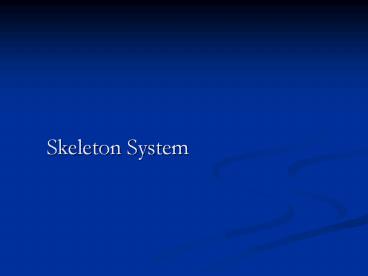Skeleton System - PowerPoint PPT Presentation
Title:
Skeleton System
Description:
Classification of bone Based on Location Axial and Appendicular Based on Shape Long, short, flat, Sesamoid, irregular Based on Ossification Endochondral and ... – PowerPoint PPT presentation
Number of Views:118
Avg rating:3.0/5.0
Title: Skeleton System
1
Skeleton System
2
(No Transcript)
3
Classification of bone
- Based on Location
- Axial and Appendicular
- Based on Shape
- Long, short, flat, Sesamoid, irregular
- Based on Ossification
- Endochondral and Intramembranous
4
Based on location
- Axial
- Formed from 80 named bones
- Consists of skull, vertebral column, and bony
thorax - Appendicular
- Remaining 126 bones of
- Thoracic girdle
- Pelvic girdle
- Attached limbs
5
5 classes based on shape
A. Long B. Short C. Flat bones- D. Irregular
bone E- Sesamoids bone
6
Classification of Bones
- Long bones
- Longer than wide
- a shaft plus two ends
- primarily compact bone
- Short bones
- roughly cube-shaped
- - mostly spongy bone
7
(No Transcript)
8
Classification of Bones
- Flat bones
- thin and flattened, usually curved
- contain two roughly parallel compact bone
surfaces with a layer of spongy bone between them - Irregular bones
- various shapes, do not fit into other categories
complicated shapes - consist mainly of spongy bone enclosed by thin
layers of compact bone - Sesamoid bone-usually small, round, flat,
associated with tendons, - patella, proximal/distal sesamoid bones
9
(No Transcript)
10
(No Transcript)
11
Anatomy of a long bone- 1. diaphysis
(dy-AF-I-sis)- 2. epiphysis (e-PIF-I-sis)-
3. Epiphyseal cartilage (physis, growth
plate)- plate of cartilage between diaphysis and
epiphysis of immature long
bones, where lengthening of long bones occurs
4. metaphysis (me-TAF-I-sis)- The joining point
of the diaphysis and epiphysis in growing bone
the part of the epiphyseal cartilage being
replace by bone.
12
5. nutrient foramen- 6. periosteum-
connective tissue surrounding the bone that is
not covered by articular cartilage necessary for
bone growth, repair, and attachment of
ligaments/tendons. 7. articular surface-
smooth layer of hyaline cartilage covering the
epiphysis, involved in joint formation. 8.
medullary cavity- 9. endosteum- 10. compact
bone- gross term for the part of the bone that
looks solid 11. spongy bone - gross term for
the part of the bone with visible spaces
13
(No Transcript)
14
Based on Ossification- Two types of
Ossification 1. Intramembranous
Ossification- 2. Endochondral Ossification-
15
Axial vs. Appendicular
- Skull
- Vertebral column
- Thoracic cage
- Remaining bones of
- Thoracic girdle
- Pelvic girdle
- Attached limbs
16
Appendicular skeleton
- Consists of
- Thoracic girdles
- Clavicle
- Scapula
- Attached limbs
- Pelvic girdles
- Pelvic bones
- Attached limbs
17
(No Transcript)
18
The shoulder girdle and upper limb
- Clavicle
- Scapula
- Each upper extremity
- Humerus
- Radius
- Ulna
- Carpal bones
- Metacarpal
- Phalanges
19
(No Transcript)
20
Scapula
- Is a flat triangular-shaped bone
- Have
- 3 borders
- Cranial, caudal, Dorsal
- 3 angles
- Cranial, caudal, Ventral
- 3 fossae
- Supraspinous, infraspinous, subscapular
21
(No Transcript)
22
The humerus
- Long bone
- It is consist of
- Proximal end (head)
- Neck
- Shaft
- Distal end
23
(No Transcript)
24
The ulna and Radius
- The two bones of the forearm
- The proximal Ext. of ulna is medial to the radius
- The distal Ext. of ulna is lateral to the radius
- Ulna
- Proximal end, shaft, distal end (head)
- Proximal end
- Olecranon process
- Trochlear notch
25
(No Transcript)
26
The Carpal bones (bones of the wrist)
- The carpal bones (are Seven in number).
- Proximal row
- Ulnar, accessory, Intermedioradial Carpal
- Distal row
- 1th , 2nd , 3rd , 4th Carpal
27
The metacarpal
- Five in the number
28
(No Transcript)
29
The Phalanges
- There are 14 phalanges
- Each finger have 3 phalanges
- Thumb (have two)































